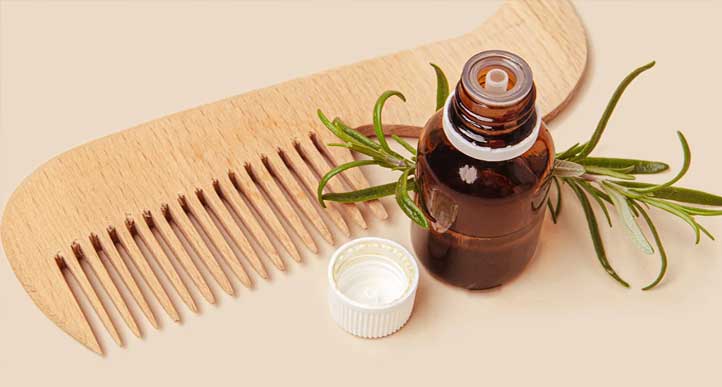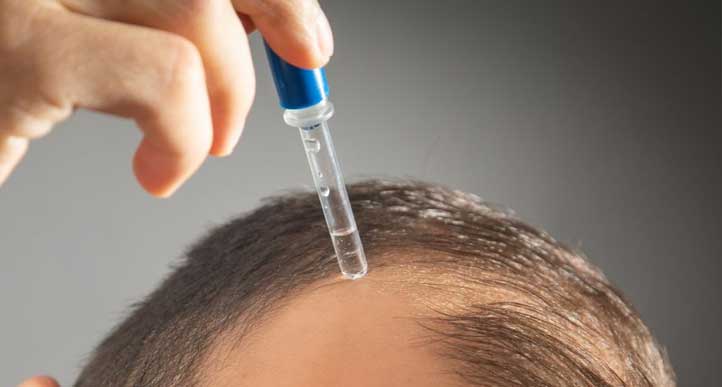
Hair loss affects millions of people around the world, and the search for effective solutions often leads to two popular options: rosemary oil and minoxidil. One is a time-tested natural remedy, the other an FDA-approved medication. But when it comes to results, comfort, and long-term use, which one truly delivers? Let’s break it down and help you figure out which might be right for your hair growth journey.
Rosemary oil, derived from the Rosmarinus officinalis plant, has been traditionally used for various medicinal purposes, including stimulating hair growth. Its growing popularity as a natural alternative to conventional hair loss treatments is largely due to its purported benefits and fewer side effects.

The exact mechanisms by which rosemary oil promotes hair growth are still being researched, but several theories suggest its efficacy:
Improved Blood Circulation: Rosemary oil is believed to enhance blood circulation to the scalp. Increased blood flow delivers more nutrients and oxygen to hair follicles, which are essential for healthy hair growt
Anti-inflammatory Properties: The oil contains compounds like rosmarinic acid, which possess anti-inflammatory properties. Inflammation of the scalp can contribute to hair loss, and reducing it may create a healthier environment for hair growth.
DHT Inhibition: Some studies suggest that rosemary oil might have properties similar to anti-androgenic drugs, potentially inhibiting dihydrotestosterone (DHT), a hormone linked to androgenetic alopecia (pattern baldness).
A 2015 study comparing rosemary oil to 2% minoxidil found that both treatments led to similar improvements in hair count over six months. Rosemary oil also had fewer complaints about itching or scalp irritation. While the study was small, it helped spark interest in rosemary as a gentle, effective option.
Rosemary oil should always be diluted with a carrier oil (like coconut or jojoba) before applying it to the scalp. Try mixing 4-5 drops of rosemary oil into a tablespoon of carrier oil, massaging it in, and letting it sit for 30 minutes before rinsing. You can also add a few drops to your shampoo.
When used properly, rosemary oil is generally safe. That said, some people may experience:
Minoxidil is one of the most widely used hair loss treatments worldwide, available in 2% and 5% strengths. Originally developed for blood pressure, its surprising side effect—hair growth—led to its adaptation as a topical treatment.

Minoxidil is thought to:
Minoxidil has years of clinical data behind it. Studies show it can be effective for many people, particularly those with hereditary thinning. Most users begin to see results in 3–6 months, but it must be used continuously or hair loss can return.
Apply minoxidil directly to a clean, dry scalp once or twice daily, depending on the product. It comes in both liquid and foam forms. Wash hands after applying, and don’t use more than recommended.
Common side effects include:
| Feature | Rosemary Oil | Minoxidil |
|---|---|---|
| Type | Natural essential oil | FDA-approved medication |
| Availability | Easily available, OTC | Available OTC |
| Clinical Research | Limited, but promising | Extensive and conclusive |
| Side Effects | Mild, rare | More frequent, but known |
| Time to Results | 4–6+ months | 3–6 months |
| Ease of Use | Needs dilution, massage in | Ready to use from bottle |
| Long-Term Use | Safe, still being studied | Safe with consistent use |
Scientific Backing: Minoxidil has a more robust body of scientific evidence and FDA approval, making it a more established and reliable treatment option. Rosemary oil, while promising, still requires more extensive research.
Side Effect Profile: Rosemary oil generally has a milder side effect profile, making it an attractive option for those seeking natural remedies or who are sensitive to pharmaceutical ingredients. Minoxidil's side effects, though usually manageable, can be more pronounced.
Mechanism of Action: While both aim to stimulate hair growth, their mechanisms differ. Minoxidil's direct impact on the hair growth cycle and vasodilation is well-documented, whereas rosemary oil's effects are thought to be more holistic, involving improved scalp health and potential hormonal modulation.
Consistency and Patience: Both treatments require consistent and long-term use to see and maintain results. Discontinuation of either can lead to a reversal of any hair growth achieved.

As the demand for natural products continues to grow, many hair care manufacturers and private label brands are using rosemary oil as a key ingredient. It provides flexibility in formulations (shampoos, scalp serums, essential oils) and appeals to consumers seeking alternatives to plant-based remedies.
If you’re in the hair care industry or planning to launch your own product line, consider how you can incorporate rosemary oil into your product range. Rosemary oil is a great choice for health-oriented brands, especially when paired with a scalp-friendly carrier and botanical blend.
The decision between rosemary oil and minoxidil ultimately depends on your individual preferences, the severity of your hair loss, and your tolerance for potential side effects.
There is no one-size-fits-all solution for hair loss. If you’re looking for a medically proven solution that works faster, minoxidil may be your best choice—but be prepared for potential side effects and a long-term commitment. If you prefer a natural, low-risk approach and are okay with slow, steady progress, rosemary oil may be the way to go.
Regardless, consistency is key. When in doubt, consult a dermatologist or a skin care manufacturer to find the best solution for your needs and hair type.

